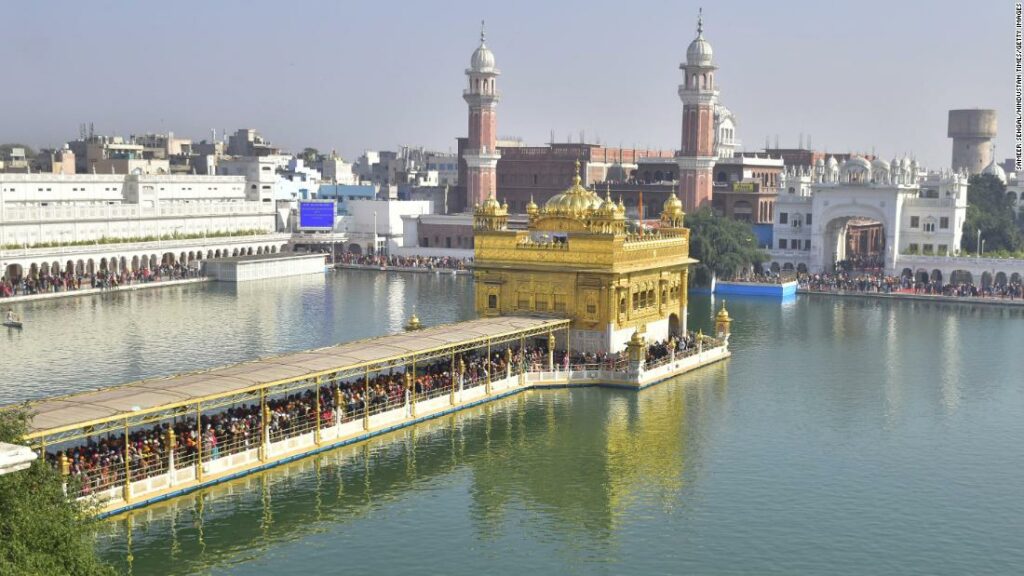Death of intruder at India’s Golden Temple met by politicians’ silence

He would not leave the Golden Temple alive. Within touching distance of Sikhism’s holy book, the man grabbed a bejeweled ceremonial sword and swung it over his head. Almost instantly, and before he could strike anyone, half a dozen devotees rushed to overpower him.A video clip of the incident, seen by CNN and originally broadcast live on local television, stops here — before an angry mob dragged the man away.The unidentified man, who was no older than 25, was dead when police arrived at the scene on December 18, according to Amritsar’s deputy police commissioner, Parminder Singh Bhandal. The mob had beaten him to death, Bhandal told reporters outside the Sikh temple, though details surrounding his death remain patchy.The man’s background, motivations and religious identity remain unknown, Bhandal added. CNN has attempted to contact the Amritsar police for further comment multiple times, but did not receive a response.For many Sikhs, the intruder’s actions were an act of “sacrilege” — desecration of the Guru Granth Sahib holy book.The incident at the Golden Temple in Amritsar, in northwestern Punjab state, also underscores simmering religious tensions in India ahead of key state elections this year, with minority groups expressing concerns over a rise in hate crimes. And it wasn’t the only alleged sacrilege case that weekend to end in the death of the accused.These case come against a broader rise in hate crimes against minority groups. A 2018 study by economist Deepankar Basu noted a 786% increase in hate crimes against all minorities between 2014 and 2018, following the BJP’s election victory. However, the BJP says it does not discriminate against minorities. Last March, the Indian government said in a statement it “treats all its citizens with equality,” adding “all laws are applied without discrimination.” The central government does not collect any data on hate crimes. The Ministry of Home Affairs told Parliament on December 21 that India’s National Crime Records Bureau (NCRB) had previously attempted to do so, but found the data “unreliable,” adding individual states were responsible for public order.CNN has attempted to contact the Ministry of Home Affairs but did not receive a response. While Basu’s study shows — and news reports indicate — the brunt of these hate crimes targeted Muslims, Sikhs were also vulnerable to attacks. And just a day after the recent Golden Temple incident, the issue of sacrilege was once again thrown into the spotlight.On December 19, a man was stabbed to death by a mob at a Sikh temple in Punjab’s Kapurthala district after an alleged sacrilege attempt, according to police. A case of sacrilege was registered against the deceased.On December 24, police arrested the Kapurthala temple’s caretaker for alleged murder. About 100 other unidentified people have also been accused of murder after police said they found “no physical evidence of sacrilege.” Police have 90 days from when they register a case to lay formal charges.According to Cynthia Mahmood, author of “Fighting for Faith and Nation: Dialogues with Sikh Militants,” the Sikh holy book is considered to be “God or divinity itself.””It is the worst thing possible to insult or disrespect, let alone damage or attempt to destroy Guru Granth Sahib,” she said, adding that instances of desecration of the Sikh holy book have increased since Modi’s rise to power. “In India, even during times of high political turmoil, religious artifacts of various traditions have been generally protected,” Mahmood said. “So these incidents have been a particular slap in the face. Sikh crowds have gathered in protest, and Indian authorities in cracking down have wounded and killed some of those who peacefully demonstrated.” A December 20 statement on Facebook by the Shiromani Gurdwara Parbandhak Committee — which manages Sikh temples — claimed government inaction had forced worshipers to take matters into their own hands. Sikhs have “lost faith in the law and government as it has not taken any culprit to severe punishment, forcing the Sikh Panth (community) to take a decision on its own,” the statement said.But Chowdhry, the prominent Sikh, said “human life is of great importance.””Religion is not so fragile that it gets threatened by something it shouldn’t be,” she said. “We cannot take the law into our own hands.”





